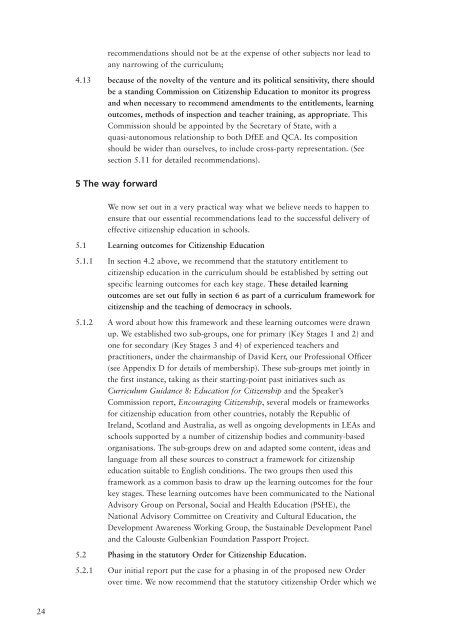Education for citizenship and the teaching of democracy in schools
Education for citizenship and the teaching of democracy in schools
Education for citizenship and the teaching of democracy in schools
You also want an ePaper? Increase the reach of your titles
YUMPU automatically turns print PDFs into web optimized ePapers that Google loves.
ecommendations should not be at <strong>the</strong> expense <strong>of</strong> o<strong>the</strong>r subjects nor lead to<br />
any narrow<strong>in</strong>g <strong>of</strong> <strong>the</strong> curriculum;<br />
4.13 because <strong>of</strong> <strong>the</strong> novelty <strong>of</strong> <strong>the</strong> venture <strong>and</strong> its political sensitivity, <strong>the</strong>re should<br />
be a st<strong>and</strong><strong>in</strong>g Commission on Citizenship <strong>Education</strong> to monitor its progress<br />
<strong>and</strong> when necessary to recommend amendments to <strong>the</strong> entitlements, learn<strong>in</strong>g<br />
outcomes, methods <strong>of</strong> <strong>in</strong>spection <strong>and</strong> teacher tra<strong>in</strong><strong>in</strong>g, as appropriate. This<br />
Commission should be appo<strong>in</strong>ted by <strong>the</strong> Secretary <strong>of</strong> State, with a<br />
quasi-autonomous relationship to both DfEE <strong>and</strong> QCA. Its composition<br />
should be wider than ourselves, to <strong>in</strong>clude cross-party representation. (See<br />
section 5.11 <strong>for</strong> detailed recommendations).<br />
5 The way <strong>for</strong>ward<br />
We now set out <strong>in</strong> a very practical way what we believe needs to happen to<br />
ensure that our essential recommendations lead to <strong>the</strong> successful delivery <strong>of</strong><br />
effective <strong>citizenship</strong> education <strong>in</strong> <strong>schools</strong>.<br />
5.1 Learn<strong>in</strong>g outcomes <strong>for</strong> Citizenship <strong>Education</strong><br />
5.1.1 In section 4.2 above, we recommend that <strong>the</strong> statutory entitlement to<br />
<strong>citizenship</strong> education <strong>in</strong> <strong>the</strong> curriculum should be established by sett<strong>in</strong>g out<br />
specific learn<strong>in</strong>g outcomes <strong>for</strong> each key stage. These detailed learn<strong>in</strong>g<br />
outcomes are set out fully <strong>in</strong> section 6 as part <strong>of</strong> a curriculum framework <strong>for</strong><br />
<strong>citizenship</strong> <strong>and</strong> <strong>the</strong> <strong>teach<strong>in</strong>g</strong> <strong>of</strong> <strong>democracy</strong> <strong>in</strong> <strong>schools</strong>.<br />
5.1.2 A word about how this framework <strong>and</strong> <strong>the</strong>se learn<strong>in</strong>g outcomes were drawn<br />
up. We established two sub-groups, one <strong>for</strong> primary (Key Stages 1 <strong>and</strong> 2) <strong>and</strong><br />
one <strong>for</strong> secondary (Key Stages 3 <strong>and</strong> 4) <strong>of</strong> experienced teachers <strong>and</strong><br />
practitioners, under <strong>the</strong> chairmanship <strong>of</strong> David Kerr, our Pr<strong>of</strong>essional Officer<br />
(see Appendix D <strong>for</strong> details <strong>of</strong> membership). These sub-groups met jo<strong>in</strong>tly <strong>in</strong><br />
<strong>the</strong> first <strong>in</strong>stance, tak<strong>in</strong>g as <strong>the</strong>ir start<strong>in</strong>g-po<strong>in</strong>t past <strong>in</strong>itiatives such as<br />
Curriculum Guidance 8: <strong>Education</strong> <strong>for</strong> Citizenship <strong>and</strong> <strong>the</strong> Speaker’s<br />
Commission report, Encourag<strong>in</strong>g Citizenship, several models or frameworks<br />
<strong>for</strong> <strong>citizenship</strong> education from o<strong>the</strong>r countries, notably <strong>the</strong> Republic <strong>of</strong><br />
Irel<strong>and</strong>, Scotl<strong>and</strong> <strong>and</strong> Australia, as well as ongo<strong>in</strong>g developments <strong>in</strong> LEAs <strong>and</strong><br />
<strong>schools</strong> supported by a number <strong>of</strong> <strong>citizenship</strong> bodies <strong>and</strong> community-based<br />
organisations. The sub-groups drew on <strong>and</strong> adapted some content, ideas <strong>and</strong><br />
language from all <strong>the</strong>se sources to construct a framework <strong>for</strong> <strong>citizenship</strong><br />
education suitable to English conditions. The two groups <strong>the</strong>n used this<br />
framework as a common basis to draw up <strong>the</strong> learn<strong>in</strong>g outcomes <strong>for</strong> <strong>the</strong> four<br />
key stages. These learn<strong>in</strong>g outcomes have been communicated to <strong>the</strong> National<br />
Advisory Group on Personal, Social <strong>and</strong> Health <strong>Education</strong> (PSHE), <strong>the</strong><br />
National Advisory Committee on Creativity <strong>and</strong> Cultural <strong>Education</strong>, <strong>the</strong><br />
Development Awareness Work<strong>in</strong>g Group, <strong>the</strong> Susta<strong>in</strong>able Development Panel<br />
<strong>and</strong> <strong>the</strong> Calouste Gulbenkian Foundation Passport Project.<br />
5.2 Phas<strong>in</strong>g <strong>in</strong> <strong>the</strong> statutory Order <strong>for</strong> Citizenship <strong>Education</strong>.<br />
5.2.1 Our <strong>in</strong>itial report put <strong>the</strong> case <strong>for</strong> a phas<strong>in</strong>g <strong>in</strong> <strong>of</strong> <strong>the</strong> proposed new Order<br />
over time. We now recommend that <strong>the</strong> statutory <strong>citizenship</strong> Order which we<br />
24


